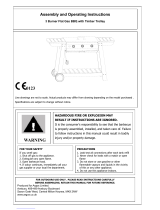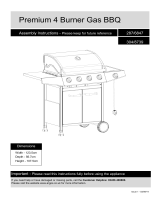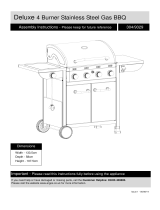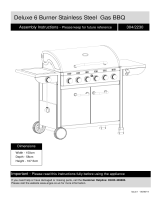Page is loading ...

Model KS10002
Photographs are not to scale.
Specifications subject to change
without prior notice.
0359
WARNING
• For outdoor use only. Not for commercial use.
• Use only Propane regulator 37mbar.
• Read instructions before using the appliance. Failure to follow instructions could
result in death, serious bodily injury, and/or property loss.
• Warning: accessible parts may be very hot. Keep young children away.
• Do not move the appliance during use.
• Turn off the gas supply at the gas bottle after use.
• Any modification of the appliance, misuse, or failure to follow the instructions may
be dangerous and will invalidate your warranty. This does not affect your statutory
rights.
• Retain these instructions for future reference.
• Leak test your barbecue annually. Check the hose connections are tight and leak
test them each time you reconnect the gas bottle.
FOR YOUR SAFETY
If you smell gas:
1. Shut off gas to the appliance.
2. Extinguish any open flame.
3. Open barbecue lid or hood.
4. If odour continues, discontinue use and
contact your local dealer.
FOR YOUR SAFETY
1. Do not store or use petrol or other flammable
vapours or liquids in the vicinity of this or any
other appliance.
2. A gas bottle not connected for use shall not be
stored in the vicinity of this or any other
appliance.
Assembly and Operating Instructions for
4 Burner Stainless Steel Gas BBQ

2
A. Parts List
Quantities vary according to model purchased. Specifications subject to change without prior notice. For more details on
hardware, please see the corresponding Hardware Reference Diagram for your barbecue model.
Code Part Qty
A1 Grill assembly 1
B1 Warming rack 1
B2 Cooking grill 2
B3 Heat tent 4
B4 Grease cup 1
B5 Grease tray assembly 1
C1 Side burner grate 1
C2 Side burner 1
C3 Side burner electrode 1
C4 Right side burner assembly 1
C5 Side burner knob 1
C6 Left side table assembly 1
C7 Side table panel 1
C8 Side burner panel 1
D1 Left rear leg 1
D2 Left front leg 1
D3 Right rear leg 1
D4 Right front leg 1
D5 Door transom 1
D6 Cart side panel 2
D7 Right front door 1
D8 Left front door 1
D9 Caster 2
D10 Bottom assembly 1
D11 Locking caster 2
E1 M6*12 bolt 30
E2 M6*8 bolt 4
E3 M6 washer 4
E4 Shoulder bolt 2

3
B1. Parts Diagram
Quantities vary according to model purchased. Specifications subject to change without prior notice. For more details on
hardware, please see the corresponding Hardware Reference Diagram for your barbecue model.

4
B2. Hardware Reference Diagram
Specifications subject to change without prior notice.
E3 M6*8 Bolt 4PCS
KS10002
E1 M6*12 Bolt 30PCS
E4 M6 Gaddi 4pcs
E5 Shoulder
Bolt 2pcs
E4 M6 Washer 4PCS
E1 M6*12 Bolt 30PCS
E3 M6 Washer 4PCS
E2 M6*8 Bolt 4PCS
E4 Shoulder Bolt 2PCS
KS10002

5
C. Assembly
TOOLS NEEDED FOR ASSEMBLY:
Medium size flat blade or Philips/cross-point screwdriver, adjustable spanner or metric spanner set.
This barbecue requires two people for assembly. Please remove all packaging materials from all individual parts before
assembling. Please lay out all nuts and bolts and check lengths before assembling. Whilst every care is taken during the
manufacture of this product, care must be taken during the assembly in case sharp edges are present.
1
Fig 1
Fig 2
Put the Left Front Leg (D2) and Left Rear Leg (D1) on the Bottom Assembly (D10) using M6*12 bolts (E1) as
fig 1. Fix the bolts tightly by the screwdriver.
2
Put the Right Front Leg (D4) and Right Rear Leg (D3) on the Bottom Assembly (D10) using M6*12 bolts (E1)
as fig 2.
Fix the bolts tightly by the screwdriver.

6
3
Fig 3a
Fig 4
Fix the Locking Casters (D11) to the Left Front Leg (D2) and Left Rear Leg (D1) as fig 3a.
Fix the Casters (D9) to the Right Front Leg (D4) and Right Rear Leg (D3) as fig 3b.
4
Fix the Cart Side Panel (D6) on the Left Front Leg (D2) and Left Rear Leg (D1) using M6*12 bolts (E1) as fig 4.
Fix the bolts tightly by the screwdriver.
Fig 3b

7
5
Fig 5
Fig 6
Fix the Cart Side Panel (D6) on the Right Front Leg (D4) and Right Rear Leg (D3) using M6*12 bolts (E1) as
fig 5. Fix the bolts tightly by the screwdriver.
6
Fix the Door Transom (D5) on the Left Front Leg (D2) and Right Front Leg (D4) using M6*12 bolts (E1) as fig
6. Fix the bolts tightly by the screwdriver.

8
7
Fig 7
Fix the Right Side Burner Assembly (C4) on the Right Front Leg (D4) and Right Rear Leg (D3) using M6*12
bolts (E1) as fig 7. Fix the bolts tightly by the screwdriver.
8
Fix the Left Side Table Assembly (C6) on the Left Front Leg (D2) and Left Rear Leg (D1) using M6*12 bolts
(E1) as fig 8. Fix the bolts tightly by the screwdriver.
Fig 8

9
9
Fig 9b
Fix the Left Front Leg (D2) and Left Rear Leg (D1) on the Grill Assembly (A1) using M6*12 bolt (E1) as fig
9a.
Fix the Right Front Leg (D4) and Right Rear Leg (D3) on the Grill Assembly (A1) using M6*12 bolt (E1) as
fig 9b.
E1
Fig 9a
Fig 9
E1
D1 D2
C6
D4
D3
C4

10
Fix the Grill Assembly (A1) on the Left Rear Leg (D1) and Left Front Leg (D2) using M6*12 bolt (E1) as fig
9c. Put the M6 Washer (E3) between the M6*12 bolt (E1) and the Grill Assembly (A1).
Fix the Grill Assembly (A1) on the Right Front Leg (D4) and Right Rear Leg (D3) using M6*12 bolt (E1) as
fig 9d. Put the M6 Washer (E3) between the M6*12 bolt (E1) and the Grill Assembly (A1).
E1
E4
Fig 9c
E1
E4
Fig 9d
E3
E1
C6
C4
E3
E1

11
10
Fig 10a
Fig 11b
11
Fig 10b
Fig 11a
Loosen the pre-assembled screws from the right front door handle. Then fix the handle on the Right Front
Door (D7) using those screws as fig 10a.
Insert the Right Front Door (D7) on the Bottom Assembly (D10) and fix on the Door Transom (D5) using
the Shoulder Bolt (E4) as fig 10b. Fix the bolt tightly by the screwdriver.
Loosen the pre-assembled screws from the left front door handle. Then fix the handle on the Left Front
Door (D8) using those screws as fig 11a.
Insert the Left Front Door (D8) on the Bottom Assembly (D10) and fix on the Door Transom (D5) using the
Shoulder Bolt (E4) as fig 11b. Fix the bolt tightly by the screwdriver.
D8
D7
E4
E4

12
12
Fix the Side Table Panel (C7) on the Side Table Assembly (C6) using M6*8 bolt (E2). Then fix the Side Table
Panel (C7) on the main control panel of the Grill Assembly (A1) using M6*12 bolt (E1) as fig 12.
Fix the Side Burner Panel (C8) on the Side Burner Assembly (C4) using M6*8 bolt (E2). Then fix the Side
Burner Panel (C8) on the main control panel of the Grill Assembly (A1) using M6*12 bolt (E1) as fig 13.
Fig 13
13
Fig 12
E2
E1
E1
E2

13
14
Fig 14d
3. Loose the M4*8 screw at the bottom of the Side Burner (C4) first. Then align the burner venturi of Side
Burner (C2) with the side burner valve. When alignment is done, fix the Side Burner (C2) on the Side Burner
Assembly (C4) by the M4*8 screw and tighten it as fig 14c.
4. Put the side burner electrode wire (C3) into the side burner valve electrode as fig 14d.
Fig 14a
Fig 14c
Fig 14b
1. Loose 2pcs of pre-assembled screws from the side burner valve bracket on HVR of Grill Assembly (A1)
as fig 14a.
2. Fix the valve on the Side Burner Panel (C8) using those 2pcs of screws.Put the Knob (C5)
on the Side Burner Panel (C8) as fig 14b.

14
15
Fig 16
16
Fig 15
Put the Heat Tent (B3), Cooking Grill (B2) and Warming Rack (B1) on the Grill Assembly (A1) as fig 16.
Put the Side Burner Grate (C1) on the Right Side Burner Assembly (C4) and align with the holes as fig 15.

15
17
Fig 18
Complete the assembly as fig 18.
18
Fig 17
Put the Grease Cup (B4) at the bottom of the Grease Tray Assembly (B5). Then put the whole Grease Tray
Assembly (B5) at the bottom of the Grill Assembly (A1) as fig 17.

16
D. Important Information
Please read these instructions carefully before
assembly and use.
• Retain these instructions for future reference.
• For outdoors use only – do not use indoors. Do
not use below ground level.
• For use with LPG bottled gas only. A regulator of
37mbar must be used for propane.
• Do not use within 1m of any flammable structure
or surface.
• LP gas cylinders should not be placed directly
underneath the barbecue.
• LP gas cylinders must not be stored or used in the
horizontal position. A leak would be very serious
and liquid could enter the gas line.
• When igniting barbecue open its hood before
lighting.
• Do not move the barbecue while alight.
• This barbecue must not be left unattended when
lit.
• The hood handle can become very hot. Grip only
the centre of the handle. Use of a cooking glove is
advised.
• Use caution when opening the hood, as hot
steam inside is released upon opening.
• Parts of this barbecue become very hot – care
must be taken when children, elderly people, and
animals are present.
• Always turn off the gas bottle when the barbecue
is not in use.
• Never cover a barbecue until it has completely
cooled.
• Never use the barbecue with the side shelf in the
down position.
• Leak test annually, and whenever the gas bottle is
removed or replaced.
• Do not store flammable materials near this
barbecue.
• Do not use aerosols near this barbecue.
• Failure to follow the manual’s instructions could
result in serious injury or damage.
• If you have any queries regarding these
instructions, contact your local dealer.
E. Gas and Regulator
This barbecue can use only propane LPG bottled
gas. Propane bottles will supply gas all year round,
even on cold winter days. A spanner may be required
to change gas bottles. The bottle should never
be
stood on the trolley base and placed directly under
the barbecue. Gas bottles should never be stored or
used laid on their side. Never store gas bottles
indoors.
YOU MUST HAVE THE PROPER REGULATOR
AND BOTTLE IN ORDER FOR THE BARBECUE TO
OPERATE SAFELY AND EFFICIENTLY. USE OF
AN INCORRECT OR FAULTY REGULATOR IS
DANGEROUS AND WILL INVALIDATE ANY
WARRANTY. Please consult your local gas dealer
for the most suitable gas bottles.
F. Installation
F1. Selecting a Location
This barbecue is for outdoor use only and should be
placed in a well-ventilated area. Take care to ensure
that it is not placed UNDER any combustible surface.
The sides of the barbecue should NEVER be closer
than 1 metre from any combustible surface. Keep
this barbecue away from any flammable materials!
F2. Precautions
Do not obstruct any ventilation openings in the
barbecue body. Secure the gas bottle on the cylinder
holder and always tighten it with the black strap
provided. Should you need to change the gas bottle,
confirm that the barbecue is switched off, and that
there are no sources of ignition (cigarettes, open
flame, sparks, etc.) near before proceeding. Inspect
the gas hose to ensure it is free of any twisting or
tension. The hose should hang freely with no bends,
folds, or kinks that could obstruct free flow of gas.
Apart from the connection point, no part of the hose
should touch any hot barbecue parts. Always inspect
the hose for cuts, cracks, or excessive wear before
use. If the hose is damaged, it must be replaced with
hose suitable for use with LPG and meet the national
standards for the country of use. The length of the
hose shall not exceed 1.5m. N.B.-The date on U.K.
hose is the date of manufacture, not the expiry date.
F3. Fixing the Regulator to the Gas Bottle
Confirm all barbecue control knobs are in the off
position. Connect the regulator to the gas bottle
according to your regulator and bottle dealer’s
instructions.
F4. Leak Testing (To be performed in a well-
ventilated area.)
Confirm all control knobs are in the off position. Open
the gas control valve on the bottle or regulator.
Check for leaks by brushing a solution of ½ water
and ½ soap over all gas system joints, including all
valve connections, hose connections and regulator
connections. NEVER USE AN OPEN FLAME to test
for leaks at anytime. If bubbles form over any of the
joints, there is a leak. Turn off the gas supply and
retighten all joints. Repeat test. If bubbles form again,
do not use the barbecue. Please contact your local
dealer for assistance. Leak test your barbecue
annually. Check the hose connections are tight and
leak test them each time you reconnect the gas
bottle.

17
G. Operation
G1. Warning
• Before proceeding, make certain that you
understand the IMPORTANT INFORMATION
section of this manual.
G2. Preparation Before Cooking
To prevent foods from sticking to the cooking grill,
please use a long handled brush to apply a light coat
of cooking or vegetable oil before each barbecuing
session. (Note: When cooking for the first time,
paint colours may change slightly as a result.
This is normal and should be expected.)
G3. Lighting the Barbecue
• Open the barbecue hood.
• Ensure all knobs are in the off position. Open the
gas control valve on the gas bottle or regulator.
• From the “OFF” position, push in and turn
leftmost control knob anti-clockwise until you feel
resistance pause 4 seconds. Then continue
turning the control knob until a click is heard and
the burner is lit. If the burner fails to ignite after
above procedure, turn all the knobs to the off
position and close the gas valve on the gas
bottle. Wait 5 minutes and then repeat the above
steps. If the barbecue still fails to light, please
refer to the manual ignition instruction in the
section below. After the leftmost burner has been
lit the left hand centre, right hand centre and right
hand burners can be lit in the sequence stated.
Failure to follow this lighting sequence could
result in a hazardous situation occurring.
• After ignition, the burner should be burned at the
high position for 3-5 minutes in order to preheat
the barbecue. This process should be done
before every cooking session. The hood (where
applicable) should be open during preheating.
• After completion of preheating, the burner should
normally be turned down to a lower position for
best cooking results.
G4. Manual Ignition Instruction for Main Burner
• Insert lit match through the match-lighting hole at
the right side of the barbecue body.
• Push in and turn the control knob anti-clockwise
to the max position, the leftmost burner should
ignite.
• After the leftmost burner is lit, push and turn the
second left control knob to max position, the
second burner should ignite automatically.
• Repeat same procedure to light the third and
rightmost burner.
• If burner fails to ignite, contact your local dealer
for assistance.
• After ignition, the burner should be burned at the
max position for 3-5 minutes in order to preheat
the barbecue. This process should be done
before every cooking session. The hood (where
applicable) should be open during preheating.
• After completion of preheating, the burner should
normally be turned down to a lower position for
best cooking results.
G5. Lighting the Side Burner
• Keep side burner free.
• Set the control knob to off and turn on the gas
supply.
• Push in and turn the control knob anti-clockwise
until you feel resistance pause 4 seconds. Then
continue turning the control knob until a click is
heard and the burner is lit.
• If the burner fails to ignite after above procedure,
turn the knob to the off position and close the gas
valve. Wait 5 minutes and then repeat the above
steps. If the barbecue still fails to light, please
refer to the manual ignition instruction in the
section below.
G6. Manual Ignition Instruction for Side Burner
• Set the control knob to the off position.
• Apply a lit match on the gap to burner ports.
• Push in and turn the control knob anti-clockwise
to max position and the burner should ignite.
•
If burner fails to ignite, contact your local dealer
for assistance.
G7. Roasting Hood Cooking
Barbecues equipped with a roasting hood give the
option of cooking with hood closed to form an ‘oven’
for roasting food, such as joints of meat, whole
chickens, etc.
When roasting, turn the burner under the food to the
OFF position. Close the hood and turn the other
burner down to a lower setting i.e. low to medium to
achieve the temperature required. DO NOT ALLOW
YOUR BARBECUE TO OVERHEAT. Avoid lifting the
hood unnecessarily as heat is lost each time the
hood is opened.
G8. End of Cooking Session
After each cooking session, turn the barbecue burner
to the “max” position and burn for 5 minutes. This
procedure will burn off cooking residue, thus making
cleaning easier. Make sure the hood is open during
this process.
G9. Turning Off Your Barbecue
When you have finished using your barbecue, turn all
the control valves fully clockwise to the “Off” position,
then switch off the gas at the bottle. Wait until the
barbecue is sufficiently cool before closing its hood.
H. CARE AND MAINTENANCE
Regularly clean your barbecue between uses and
especially after extended periods of storage. Ensure
the barbecue and its components are sufficiently cool

18
before cleaning. Do not leave the barbecue exposed
to outside weather conditions or stored in damp,
moist areas.
• Never douse the barbecue with water when its
surfaces are hot.
• Never handle hot parts with unprotected hands.
H1. Cooking Grill
Clean with hot soapy water. To remove any food
residue, use a mild cream cleaner on a non-abrasive
pad. Rinse well and dry thoroughly.
H2. Burner Maintenance
Your burner has been preset for optimal flame
performance. You will normally see a blue flame,
possibly with a small yellow tip when the burner is
alight. If the flame pattern is significantly yellow, this
could be a problem caused by grease from cooking
blocking the burner or spiders or other insects in the
burner venturi. This can result in the flow of the gas
and air mixture being restricted or blocked which may
result in a fire behind the control panel causing
serious damage to your barbecue. If this happens,
the gas should be immediately turned off at the
bottle. Burners should be inspected and cleaned on
a regular basis in addition to the following conditions:
1) Bringing the barbecue out of storage.
2) One or more of the burners do not ignite.
3) The burner flame pattern is significantly yellow.
4) The gas ignites behind the control panel.
To clean a burner, remove it from the barbecue. The
outside of the burner can be cleaned with a wire
brush. Clean the portholes with a pipe cleaner or
piece of wire. Take care not to enlarge the portholes.
Clean the insect screen on the end of the venturi
tube with a bristle brush (i.e. an old toothbrush).
Clean the venturi tube with a pipe cleaner or piece of
wire. You may need a torch to see into the venturi
tube to make sure it is clear. ”Turn the burner up on
end and lightly tap against a piece of wood to
dislodge any debris from inside.”
H3. Barbecue Body
Regularly remove excess grease or fat from the
barbecue body with a soft plastic or wooden scraper.
It is not necessary to remove all the grease from the
body. If you need to clean fully, use hot soapy water
and a cloth, or nylon-bristled brush only. Remove
cooking surfaces and burners before full cleaning. Do
not immerse the gas controls or manifold in water.
Check burner operation after carefully refitting into
body.
H4. Fixings
All screws and bolts, etc. should be checked and
tightened on a regular basis.
H5. Storage
Store your barbecue in a cool dry place. It must be
inspected on a regular basis as damp or
condensation can form which may result in damage
to the barbecue. It may be necessary to dry the
barbecue and the inside of the cover if used. Mould
can grow under these conditions and should be
cleaned and treated if required. Any rust that is found
that does not come into contact with the food should
be treated with a rust inhibitor and painted with
barbecue paint or a heat resistant paint. Chrome
plated warming racks and grills should be coated
with cooking oil. Wrap the burners in aluminium foil to
help prevent insects or other debris from obstructing
the burners.
The gas bottle must be always be disconnected from
the barbecue and stored in a well ventilated area at
least 1 metre away from any fixed ignition source. Do
not store inside residential accommodation. Never
store cylinders below ground level (e.g. cellars). Do
not let children tamper with bottles.
I. Technical Specifications
This barbecue grill is manufactured by:
Donguang Kingsun Enterprises Co. Ltd.
Address: Xicheng Area 2, Shiyong Village, Hengli
Town, Dongguan City, Guangdong Province,
China
Model Number KS10002
Gas Category I3P (37)
Type of Gas Propane
Gas Pressure 37 mbar
Pin Number 359/BU/1016
Injector Size (Main Burner) 0.91mm
Injector Size (Side Burner) 0.91mm
Total Heat Input 16.0 kW
4 Burner Heat Input 12.8 kW
Side Burner Heat Input 3.2 kW
Gas Consumption 1142 g/h
Country of Destination GB and IE

19
L. Troubleshooting
Problem Possible Cause Solution
Burner will not light using the
ignition system
LP gas cylinder is empty Replace with full cylinder
Faulty regulator Have regulator checked or replace
Obstructions in burner Clean burner
Obstructions in gas jets or gas hose Clean jets and gas hose
Electrode wire is loose or disconnected on
electrode or ignition unit.
Reconnect wire
Electrode or wire is damaged Change electrode and wire
Faulty pushbutton ignitor Change ignitor
Burner will not light with a match
LP gas cylinder is empty Replace with full cylinder
Faulty regulator Have regulator checked or replace
Obstructions in burner Clean burner
Obstructions in gas jets or gas hose Clean jets and gas hose
Low flame or flashback (fire in
burner tube— a hissing or
roaring noise may be heard)
LP gas cylinder too small Use larger cylinder.
Obstructions in burner Clean burner
Obstructions in gas jets or gas hose Clean jets and gas hose
Windy conditions. Use BBQ in a more sheltered position
Gas valve knob difficult to turn
Gas valve jammed Replace gas valve
Argos Limited, MK9 2NW
/





